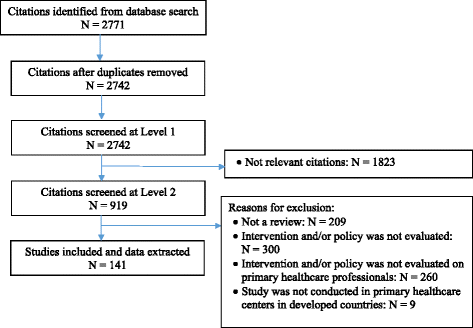Behavior change interventions and policies influencing primary healthcare professionals' practice-an overview of reviews
- PMID: 28057024
- PMCID: PMC5216570
- DOI: 10.1186/s13012-016-0538-8
Behavior change interventions and policies influencing primary healthcare professionals' practice-an overview of reviews
Erratum in
-
Erratum to: Behavior change interventions and policies influencing primary healthcare professionals' practice-an overview of reviews.Implement Sci. 2017 Mar 17;12(1):38. doi: 10.1186/s13012-017-0568-x. Implement Sci. 2017. PMID: 28314388 Free PMC article. No abstract available.
Abstract
Background: There is a plethora of interventions and policies aimed at changing practice habits of primary healthcare professionals, but it is unclear which are the most appropriate, sustainable, and effective. We aimed to evaluate the evidence on behavior change interventions and policies directed at healthcare professionals working in primary healthcare centers.
Methods: Study design: overview of reviews.
Data source: MEDLINE (Ovid), Embase (Ovid), The Cochrane Library (Wiley), CINAHL (EbscoHost), and grey literature (January 2005 to July 2015).
Study selection: two reviewers independently, and in duplicate, identified systematic reviews, overviews of reviews, scoping reviews, rapid reviews, and relevant health technology reports published in full-text in the English language.
Data extraction and synthesis: two reviewers extracted data pertaining to the types of reviews, study designs, number of studies, demographics of the professionals enrolled, interventions, outcomes, and authors' conclusions for the included studies. We evaluated the methodological quality of the included studies using the AMSTAR scale. For the comparative evaluation, we classified interventions according to the behavior change wheel (Michie et al.).
Results: Of 2771 citations retrieved, we included 138 reviews representing 3502 individual studies. The majority of systematic reviews (91%) investigated behavior and practice changes among family physicians. Interactive and multifaceted continuous medical education programs, training with audit and feedback, and clinical decision support systems were found to be beneficial in improving knowledge, optimizing screening rate and prescriptions, enhancing patient outcomes, and reducing adverse events. Collaborative team-based policies involving primarily family physicians, nurses, and pharmacists were found to be most effective. Available evidence on environmental restructuring and modeling was found to be effective in improving collaboration and adherence to treatment guidelines. Limited evidence on nurse-led care approaches were found to be as effective as general practitioners in patient satisfaction in settings like asthma, cardiovascular, and diabetes clinics, although this needs further evaluation. Evidence does not support the use of financial incentives to family physicians, especially for long-term behavior change.
Conclusions: Behavior change interventions including education, training, and enablement in the context of collaborative team-based approaches are effective to change practice of primary healthcare professionals. Environmental restructuring approaches including nurse-led care and modeling need further evaluation. Financial incentives to family physicians do not influence long-term practice change.
Figures
References
-
- PHAC . Public health agency of Canada: chronic disease infobase. 2014.
-
- Mirolla M. The cost of chronic disease in Canada. 2004.
-
- Sanmartin C, Houle C, Tremblay S, Berthelot JM. Changes in unmet health care needs. Health Rep. 2002;13:15–21. - PubMed
Publication types
MeSH terms
Grants and funding
LinkOut - more resources
Full Text Sources
Other Literature Sources
Medical


